Expression in Math
In mathematics, an expression is a combination of numbers, symbols, and operators (such as +, -, ×, ÷) that represents a value. It can include variables, constants, and mathematical operations. Expressions can be simple or complex, and they are used to represent a wide range of mathematical ideas and problems.
Types of Expressions
There are several types of expressions in mathematics:
- Numerical Expressions: These are expressions that involve only numbers and operations. For example, 5 + 3 or 12 ÷ 4.
- Variable Expressions: These expressions contain variables, which are symbols that represent unknown or changing values. For example, 3x + 7 or 2y - 5.
- Algebraic Expressions: These expressions combine numbers, variables, and operations. For example, 4x + 2y or 3(x + 5).
- Literal Expressions: These are expressions with letters that represent certain quantities. For example, the formula for the area of a rectangle, A = l × w, is a literal expression.
Study Guide
To understand and work with expressions effectively, it's important to grasp the following concepts:
- Understanding the basic operations: addition, subtraction, multiplication, and division.
- Recognizing the parts of an expression: constants, variables, and operators.
- Learning the rules for combining like terms and simplifying expressions.
- Practicing the evaluation of expressions for given values of variables.
- Working with literal expressions and understanding their applications in formulas and equations.
Study tip: Practice creating and solving different types of expressions, and also try to relate them to real-world situations for better understanding.
[Expression] Related Worksheets and Study Guides:
.◂Science Worksheets and Study Guides Fourth Grade. Invertebrates - Animals without Backbones
Study Guide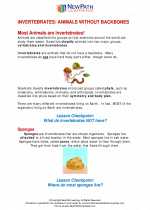 Invertebrates - Animals without Backbones
Invertebrates - Animals without Backbones  Activity Lesson
Activity Lesson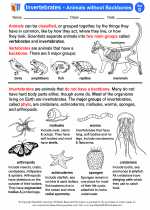 Invertebrates - Animals without Backbones
Invertebrates - Animals without Backbones  Worksheet/Answer key
Worksheet/Answer key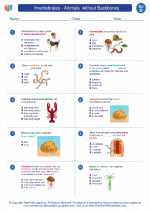 Invertebrates - Animals without Backbones
Invertebrates - Animals without Backbones  Worksheet/Answer key
Worksheet/Answer key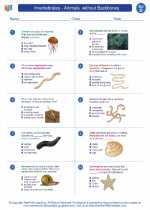 Invertebrates - Animals without Backbones
Invertebrates - Animals without Backbones  Worksheet/Answer key
Worksheet/Answer key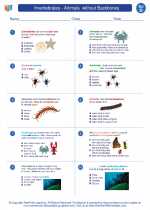 Invertebrates - Animals without Backbones
Invertebrates - Animals without Backbones  Worksheet/Answer key
Worksheet/Answer key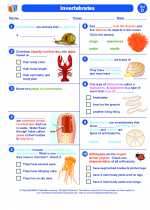 Invertebrates
Invertebrates  Vocabulary/Answer key
Vocabulary/Answer key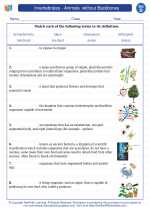 Invertebrates - Animals without Backbones
Invertebrates - Animals without Backbones  Vocabulary/Answer key
Vocabulary/Answer key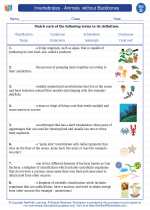 Invertebrates - Animals without Backbones
Invertebrates - Animals without Backbones  Vocabulary/Answer key
Vocabulary/Answer key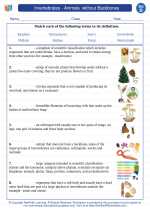 Invertebrates - Animals without Backbones
Invertebrates - Animals without Backbones  Vocabulary/Answer key
Vocabulary/Answer key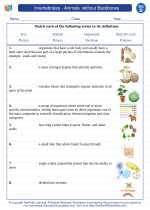 Invertebrates - Animals without Backbones
Invertebrates - Animals without Backbones  Vocabulary/Answer key
Vocabulary/Answer key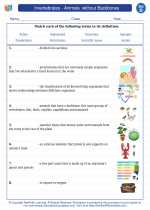 Invertebrates - Animals without Backbones
Invertebrates - Animals without Backbones 

 Activity Lesson
Activity Lesson
 Worksheet/Answer key
Worksheet/Answer key
 Worksheet/Answer key
Worksheet/Answer key
 Worksheet/Answer key
Worksheet/Answer key
 Worksheet/Answer key
Worksheet/Answer key
 Vocabulary/Answer key
Vocabulary/Answer key
 Vocabulary/Answer key
Vocabulary/Answer key
 Vocabulary/Answer key
Vocabulary/Answer key
 Vocabulary/Answer key
Vocabulary/Answer key
 Vocabulary/Answer key
Vocabulary/Answer key

The resources above cover the following skills:
Life Science: The students will use scientific skills and processes to explain the dynamic nature of living things, their interactions, and the results from the interactions that occur over time.
Diversity of Life: Explain how animals and plants can be grouped according to observable features.
Classify a variety of animals and plants according to their observable features and provide reasons for placing them into different groups.